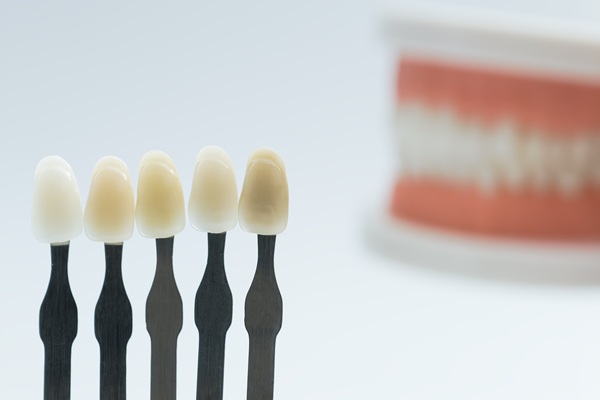What a General Dentist Wants You to Know About Using Fluoride

Fluoride is a preventative measure that your general dentist uses to help protect your teeth between visits. It is also an ingredient in toothpaste that can give added protection.
One of the most hotly debated topics surrounding toothpaste and tooth brushing is whether or not you should be using toothpaste that contains fluoride. Using toothpaste with fluoride certainly has health benefits for your teeth, but is it affecting other parts of your body? Let's look at what exactly fluoride is and its effects on the body.
What is fluoride?
Fluoride is a natural mineral produced by the body and utilized mainly by the teeth. As sugars and acids eat away at the enamel that protects your teeth, your body makes fluoride, calcium, and phosphate to help coat the teeth and reinforce the enamel that protects them.
Fluoride is inorganic and is a monoatomic anion of fluorine that is usually white or colorless. However, the fluoride itself is a salty substance that has a bitter taste but is odorless. It can be found outside of the body in many forms, such as water, seafood, chicken, and certain teas and medications.
How can fluoride help my teeth?
There is little doubt about the benefits that fluoride has. It makes your teeth more robust and more resistant to cavities and other mouth diseases. Fluoride is essential to building up the enamel that coats your teeth and protects them from damage and decay.
Your dentist will typically use fluoride in your visit to him via one method or another. This can be with a gel or in a liquid form which the dentist will have you swirl in your mouth or brush onto your teeth. This is done because of fluoride's enormous role in preventing tooth decay.
Fluoride is also crucial in strengthening your teeth and making them more resistant to chipping and scratches. When combined with saliva, fluoride turns into fluorapatite, a compound especially important for preventing tooth decay.
If you have exposed root surfaces due to recessive gums, then fluoride is excellent for reducing the sensitivity of these areas. The use of fluoride also impairs other gum conditions such as periodontitis. Fluoride will help reduce the pain and sensitivity involved with this disease and aid in its treatment.
Risks involved with using fluoride
Fluoride is a mineral that has definite upsides when it comes to taking care of your teeth. However, there's another side to this element that users should know before using fluoride.
Using too much fluoride can cause dental fluorosis in children under the age of 6. This condition manifests itself in white specks on the teeth, eventually leading to tooth discoloration. To keep this from happening, children under the age of 6 shouldn't use fluoride.
Another condition known as skeletal fluorosis can also result from using too much fluoride. This condition is dangerous because it causes the bones to become more brittle and less elastic, making the body more prone to fractures and broken bones. Make sure you consult your general dentist before using fluoride.
Perhaps the biggest thing that makes people hesitant about using fluoride is that it has recently been documented as a potential neurotoxin. Children exposed to fluoride before birth run an increased risk of poor cognitive outcomes throughout development.
Talk to your dentist
If you are worried about using fluoride, ask your dentist. They are the best source of information when it comes to taking care of your teeth and keeping a bright smile for many years to come.
If you feel like you are having any type of symptoms that are causing you to think you may not be heading in the right direction, make an appointment with your dentist as soon as possible.
The best way to get to the root of a dental problem is to see your dentist regularly and when you feel you have an issue. They can diagnose and treat your issue early on to prevent more serious issues down the road.
Talk to your dentist about fluoride
Overall, your general dentist uses fluoride for a reason: because it's incredibly beneficial to your dental health. As long as you adhere to the risks involved and don't do anything to put your overall health at risk, fluoride is one of the most critical elements to maintaining your oral health.
Take control of your oral health and follow any suggestions your dentist may give you. It will be worth it.
Request an appointment here: https://implantfamilydentist.com or call Miami Implant & Family Dentists at (305) 230-4040 for an appointment in our Miami office.
Check out what others are saying about our dental services on Yelp: General Dentist in Miami, FL.
Recent Posts
General dentistry commonly handles toothaches among other dental concerns. While this is a routine issue that is easily treatable, it is common for patients to have several questions about it and what they should do if they experience it. Here we will answer some commonly asked general dentistry questions and advice on the best ways…
Seeing a general dentist for regular checkups should be part of your dental care routine. This dental professional can help maintain and even improve your teeth and gum health. Asking the right questions can help you know more about proper oral care. Below are some of the questions you can ask your general dentist during…
A general dentist will tell you all of the benefits of flossing on a regular basis. Flossing should be a very important part of your daily oral hygiene routine. Brushing your teeth is the first round of defense in fighting tooth decay but do not underestimate the value of flossing. When you get into the habit…
If a general dentist recommends fluoride treatments, patients may express concerns about the lasting effects of fluoride. They may also wonder whether eating and drinking are possible immediately afterward. Fortunately, fluoride is one of the easiest dental treatments to undergo with little to no waiting period and great benefits in the long term. Just a…


